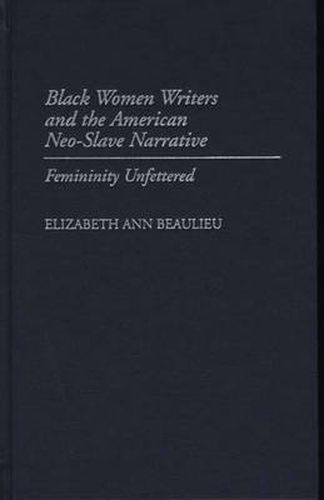Readings Newsletter
Become a Readings Member to make your shopping experience even easier.
Sign in or sign up for free!
You’re not far away from qualifying for FREE standard shipping within Australia
You’ve qualified for FREE standard shipping within Australia
The cart is loading…






The neo-slave narrative is an important development in American literary history and has serious revisionist intentions at its foundation. This book examines how contemporary African American women writers have shaped the genre. These authors have written neo-slave narratives to reinscribe history from the perspective of the African American woman, most specifically the nineteenth century enslaved mother. The writers considered in this study-Sherley Anne Williams, Toni Morrison, J. California Cooper, Gayl Jones, and Octavia Butler-explore American slavery through the lens of gender, both to interrogate the myth that enslaved women, denied the privilege of having a gender identity by the institution of slavery, were in fact genderless, and to celebrate the acts of resistance which enabled enslaved women to mother in the fullest sense of the term.
The volume begins with an overview of historical representations of slavery in America, from the slave narrative itself to the revisionist scholarship of the 1960s. The book then examines several individual neo-slave narratives, such as Margaret Walker’s Jubilee (1966), Williams’ Dessa Rose (1986), Morrison’s Beloved (1987), Cooper’s Family (1991), Jones’ Corregidora (1975), and Butler’s Kindred (1979). What the women in these novels have in common is the fact that they mother; what the writers have in common is a tendency to utilize subversive strategies such as reversal, blurring, and the creation of myth to dramatize gender identity and to highlight the varied nature of motherhood as enslaved women experienced it. The final chapter evaluates the influence of the neo-slave narrative on American literature in general and on popular perceptions and misperceptions of African American women.
$9.00 standard shipping within Australia
FREE standard shipping within Australia for orders over $100.00
Express & International shipping calculated at checkout
The neo-slave narrative is an important development in American literary history and has serious revisionist intentions at its foundation. This book examines how contemporary African American women writers have shaped the genre. These authors have written neo-slave narratives to reinscribe history from the perspective of the African American woman, most specifically the nineteenth century enslaved mother. The writers considered in this study-Sherley Anne Williams, Toni Morrison, J. California Cooper, Gayl Jones, and Octavia Butler-explore American slavery through the lens of gender, both to interrogate the myth that enslaved women, denied the privilege of having a gender identity by the institution of slavery, were in fact genderless, and to celebrate the acts of resistance which enabled enslaved women to mother in the fullest sense of the term.
The volume begins with an overview of historical representations of slavery in America, from the slave narrative itself to the revisionist scholarship of the 1960s. The book then examines several individual neo-slave narratives, such as Margaret Walker’s Jubilee (1966), Williams’ Dessa Rose (1986), Morrison’s Beloved (1987), Cooper’s Family (1991), Jones’ Corregidora (1975), and Butler’s Kindred (1979). What the women in these novels have in common is the fact that they mother; what the writers have in common is a tendency to utilize subversive strategies such as reversal, blurring, and the creation of myth to dramatize gender identity and to highlight the varied nature of motherhood as enslaved women experienced it. The final chapter evaluates the influence of the neo-slave narrative on American literature in general and on popular perceptions and misperceptions of African American women.